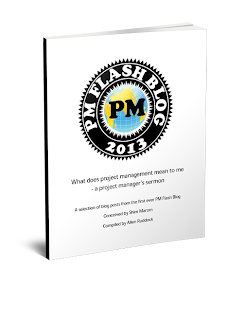This is not as stuffy as it sounds:
Plan-Do Check-Act --
Seems intuitive, of course, but in its written form, perhaps only 70 years old (only!) W. Edwards Deming gets most of the credit. Deming--working in Japan and else where in the mid-20th century--introduced very practical ideas of process control as a means to limit variations in product quality.
- Plan-do-check-act (PDCA) envisions planning--just enough, and gasp! perhaps an estimate as well--for what is to be done, then doing it—that is the plan-do.
- Next, measure results—measuring is the check activity (did someone say: accountability?)—and
- Then act on the measurement results. To act in the PDCA sense means to reflect upon lessons learned and provide feedback for corrective actions to the next iteration of the plan.
And, who's not all about product quality?
Deming was a product guy; he came at product quality from the point of view of the product:
Make the product the same way each time and make it work within limits that are acceptable to the customer. But, developing software is not a repetitive cycle (make it the same way each time) although processes are repetitive and they can be somewhat the same quality each time.
The modern poster child for defined process control is Six Sigma, but let's not go there; let's go to Agile
Agile Thinking
Ken Schwaber—a leading SCRUM methodologist—objecting to defined process control, puts it this way, “[defined process control] is based on processes that work only because their degree of imprecision is acceptable… When defined process control cannot be achieved because of the complexity of the intermediate activities; something called empirical process control has to be employed.” In Schwaber’s view, software is too complex to expect defects to be contained within predefined error limits. Empirical control is the answer; empirical control is derived from observed facts, adapted to the situation, and not determined by preplanned limits from previous projects.
A project management tip: Deming introduced the PDCA cycle, which is can be wholly embraced by agile teams
• The cycle really applies to all agile iterations. The plan-do is equivalent to the planning session followed by development, test, and integration.
• Especially relevant is the check-act that provides measurement and feedback for continuous improvement.
• Deming focused on eliminating unsatisfactory results before they reached the customer. In agile parlance, every object must pass its unit, functional, and system test, and be acceptable to the customer's idea of quality in the large sense: function, accuracy, available, and appealing
Read my contribution to the Flashblog

